The Idiot
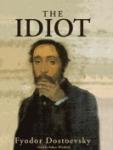
Author:Fyodor Dostoyevsky
Tag:The IdiotFyodor Dostoyevsky
The Idiot is a novel written by the 19th-century Russian author Fyodor Dostoyevsky. It was first published serially in The Russian Messenger between 1868 and 1869. The Idiot is ranked beside some of Dostoyevsky's other works as one of the most brilliant literary achievements of the "Golden Age" of Russian literature.
Prince Lev Nikolayevich Myshkin, a fair-haired young man in his late twenties and a descendant of one of the oldest Russian lines of nobility, arrives in St. Petersburg on a November morning. He has spent the last four years in a Swiss clinic for treatment of his epilepsy and supposed intellectual deficiencies. On the train journey to Russia, Myshkin meets Parfyon Semyonovich Rogozhin, and is struck by his passionate intensity, particularly in relation to a beautiful woman with whom he is obsessed.
Myshkin's only relation in St. Petersburg is the very distant Lizaveta Prokofyevna Yepanchin. Madame Yepanchin is the wife of General Yepanchin, a wealthy and respected man in his late fifties. The prince makes the acquaintance of the Yepanchins, who have three daughters—Alexandra, Adelaida, and Aglaya, the last being the youngest and the most beautiful.
General Yepanchin has an ambitious and vain assistant named Gavrila Ardalyonovich Ivolgin (nicknamed Ganya) whom Myshkin also meets during his visit to the household. Ganya, though actually in love with Aglaya, is trying to marry Anastassya Filippovna Barashkov, an extraordinarily beautiful femme fatale who was once the mistress of the aristocrat Totsky. Totsky has promised Ganya 75,000 rubles if he marries the "fallen" Nastassya Filippovna instead. As Myshkin is so innocent and naïve, Ganya openly discusses the subject of the proposed marriage in front of the prince. It turns out that Nastassya Filippovna is the same woman pursued obsessively by Rogozhin, and Ganya asks the Prince whether Rogozhin would marry her. The Prince replies that he might well marry her and then murder her a week later.
The prince rents a room in the Ivolgin apartment, also occupied by Ganya; Ganya's sister Varvara Ardalyonovna (Varya); his mother, Nina Alexandrovna; his teenage brother, Nikolai (Kolya); his father, General Ivolgin; and another lodger named Ferdyshchenko.
Nastassya Filippovna arrives and insults Ganya's family, which has refused to accept her as a possible wife for Ganya. Myshkin restrains her from continuing. The insult is compounded by the arrival of Rogozhin accompanied by a rowdy crowd of drunks and rogues. On the strength of his newly inherited fortune, Rogozhin promises to bring 100,000 rubles to Nastassya Filippovna's birthday party that evening, at which she is to announce whom she shall marry.
Among the guests at the party are Totsky, General Yepanchin, Ganya, Ferdyshchenko, Ptitsyn — a usurer friend of Ganya's who is a suitor to Varya Ivolgin — and others. With the acquiescence of Kolya, Prince Myshkin arrives, uninvited. Following Myshkin's advice, Nastassya Filippovna refuses Ganya's proposal. Rogozhin arrives with the promised 100,000 rubles, but Myshkin himself offers to marry Nastassya Filippovna instead, announcing that he has recently received a large inheritance. Though surprised and deeply touched by Myshkin's love, Nastassya Filippovna, after throwing the 100,000 rubles in the fire and telling Ganya they are his if he wants to get them out, chooses to leave with Rogozhin. Myshkin follows them.
For the next six months or so Nastassya Filippovna is torn between Myshkin's compassionate and insightful love for her and a self-punishing desire to ruin herself by submitting to Rogozhin's passion. Myshkin is tormented by her suffering, and Rogozhin is tormented by her love for Myshkin and frequently expressed disdain for his own claims on her. Myshkin's inheritance turns out to be smaller than expected and shrinks further as he satisfies the often fraudulent claims of creditors and alleged relatives. Finally, he returns to St. Petersburg and visits Rogozhin's house. They discuss religion and exchange crosses. But the main topic of their discussion is Nastassya Filippovna. Myshkin becomes increasingly horrified at Rogozhin's attitude to her. Rogozhin confesses to beating her in a jealous rage, and raises the possibility of cutting her throat.
Later that day, Rogozhin, motivated by jealousy, attempts to stab Myshkin in the hall of the prince's hotel, but an unanticipated epileptic fit saves the prince. Myshkin then leaves St. Petersburg for Pavlovsk, a nearby town popular as a summer residence of St. Petersburg nobility. The prince rents several rooms from Lebedev, a rogue functionary who is, however, a highly complex character, first introduced at the time Myshkin meets Rogozhin on the train to Petersburg. Most of the novel's characters – the Yepanchins, the Ivolgins, Varya and her husband Ptitsyn, and Nastassya Filippovna – spend the summer in Pavlovsk as well.
Burdovsky, a young man who claims to be the son of Myshkin's late benefactor, Pavlishchev, demands money from Myshkin as a "just" reimbursement for Pavlishchev's support. Burdovsky is supported by a group of insolent young men who include the consumptive seventeen-year old Hippolite Terentyev, a friend of Kolya Ivolgin. Although Burdovsky's claim is obviously fraudulent – he is not Pavlishchev's son at all –, Myshkin is willing to help Burdovsky financially.
The prince now spends much of his time at the Yepanchins'. He falls in love with Aglaya and she appears to reciprocate his feelings. A haughty, willful, and capricious girl, she refuses to publicly admit her love and in fact often openly mocks him. Yet her family begins to acknowledge him as her fiancé and even stages a dinner party in the couple's honor for members of the Russian nobility.
Over the course of an ardent speech on religion and the future of aristocracy, Myshkin accidentally breaks a beautiful Chinese vase. Later that evening he suffers a mild epileptic fit. Guests and family agree that the sickly prince is not a good match for Aglaya.
Yet Aglaya does not renounce Myshkin and even arranges to meet Nastassya Filippovna, who has been writing her letters in an attempt to persuade her to marry Myshkin. At the meeting the two women confront the Prince and demand that he choose between Aglaya, whom he loves romantically, and Nastassya Filippovna, for whom he has compassionate pity. Myshkin demurs, prompting Aglaya to depart, ending all hope for an engagement between them. Nastassya Filippovna then renews her vow to marry the Prince, but goes off with Rogozhin instead.
The prince follows Nastassya and Rogozhin to St. Petersburg and learns that Rogozhin has slain Nastassya Filippovna during the night. The two men keep vigil over her body, which Rogozhin has laid out in his study. Rogozhin is sentenced to fifteen years of hard labor in Siberia, Myshkin goes mad and returns to the sanitorium and Aglaya, against the wishes of her family, marries a wealthy, exiled Polish count who later is discovered to be neither wealthy, nor a count, nor an exile – at least, not a political exile –, and who, along with a Catholic priest, has turned her against her family.
Uncle Tom's Cabin
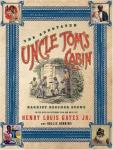
Author:Harriet Beecher Stowe
Tag:Uncle Tom's CabinHarriet Beecher Stowe
Uncle Tom's Cabin; or, Life Among the Lowly is an anti-slavery novel by American author Harriet Beecher Stowe. Published in 1852, the novel "helped lay the groundwork for the Civil War", according to Will Kaufman.
Stowe, a Connecticut-born teacher at the Hartford Female Academy and an active abolitionist, featured the character of Uncle Tom, a long-suffering black slave around whom the stories of other characters revolve. The sentimental novel depicts the reality of slavery while also asserting that Christian love can overcome something as destructive as enslavement of fellow human beings.
Uncle Tom's Cabin was the best-selling novel of the 19th century and the second best-selling book of that century, following the Bible. It is credited with helping fuel the abolitionist cause in the 1850s. In the first year after it was published, 300,000 copies of the book were sold in the United States; one million copies were sold in Great Britain. In 1855, three years after it was published, it was called "the most popular novel of our day." The impact attributed to the book is great, reinforced by a story that when Abraham Lincoln met Stowe at the start of the Civil War, Lincoln declared, "So this is the little lady who started this great war." The quote is apocryphal; it did not appear in print until 1896, and it has been argued that "The long-term durability of Lincoln's greeting as an anecdote in literary studies and Stowe scholarship can perhaps be explained in part by the desire among many contemporary intellectuals ... to affirm the role of literature as an agent of social change."
The book and the plays it inspired helped popularize a number of stereotypes about black people. These include the affectionate, dark-skinned "mammy"; the "pickaninny" stereotype of black children; and the "Uncle Tom", or dutiful, long-suffering servant faithful to his white master or mistress. In recent years, the negative associations with Uncle Tom's Cabin have, to an extent, overshadowed the historical impact of the book as a "vital antislavery tool."
The Diary of a Nobody
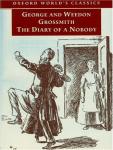
Author:George Grossmith
Tag:The Diary of a NobodyGeorge Grossmith
The Diary of a Nobody is an English comic novel written by George Grossmith and his brother Weedon Grossmith, with illustrations by Weedon. The book first appeared in Punch magazine in 1888 – 89, and was first printed in book form in 1892. It is considered a classic work of humour and has never been out of print.
In The Diary of a Nobody the Grossmiths create an accurate, if amusing, record of the manners, customs and experiences of lower-middle-class, suburban Londoners of the late Victorian era. The diary is the fictitious record of fifteen months in the life of Mr. Charles Pooter, a middle-aged city clerk of lower middle-class status but significant social aspirations, living in the fictional "Brickfield Terrace" in Upper Holloway, which was then a typical suburb of the impecuniously respectable kind. Other characters include his wife Carrie (Caroline), his son Lupin, his friends Mr. Cummings and Mr. Gowing, and Lupin's unsuitable fiancée, Daisy Mutlar. The humour derives from Pooter's unconscious gaffes and self-importance, as well as the snubs he receives from those he considers socially inferior, such as tradesmen.
Bleak House
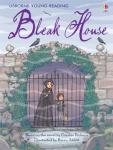
Author:Charles Dickens
Tag:Bleak HouseCharles Dickens
Bleak House is a novel by Charles Dickens, published in 20 monthly instalments between March 1852 and September 1853. It is held to be one of Dickens' finest novels, containing one of the most vast, complex and engaging arrays of minor characters and sub-plots in his entire canon. The story is told partly by the novel's heroine, Esther Summerson, and partly by a mostly omniscient narrator. Memorable characters include the menacing lawyer Tulkinghorn, the friendly but depressive John Jarndyce, and the childish and disingenuous Harold Skimpole, as well as the likeable but imprudent Richard Carstone.
Sir Leicester Dedlock and Honoria, Lady Dedlock (his junior by more than 20 years) live at his estate of Chesney Wold. Unknown to Sir Leicester, Lady Dedlock had a lover, Captain Hawdon, before she married Sir Leicester — and had a child by him, Esther Summerson. Lady Dedlock, believing her daughter is dead, has chosen to live out her days 'bored to death' as a fashionable lady of the world.
Esther is raised by Miss Barbary, Lady Dedlock's spartan sister, who instills a sense of worthlessness in her that Esther will battle throughout the novel. Esther doesn't know that Miss Barbary is her aunt, thinking of her only as her godmother. When Miss Barbary dies, the Chancery lawyer Conversation Kenge takes charge of Esther's future on the instruction of his client, John Jarndyce. Jarndyce becomes Esther's guardian, and after attending school in Reading for six years, Esther moves in with him at Bleak House, along with his wards, Richard Carstone and Ada Clare. Esther is to be Ada's companion.
Esther soon befriends both Ada and Richard, who are cousins. They are beneficiaries in one of the wills at issue in Jarndyce and Jarndyce; their guardian is a beneficiary under another will, and in some undefined way the two wills conflict. Richard and Ada soon fall in love, but though Mr. Jarndyce doesn't oppose the match, he stipulates that Richard (who is inconstant) must first choose a profession. Richard first tries the medical profession, and Esther first meets the newly-qualified Dr. Allan Woodcourt at the house of Richard's prospective tutor, Mr. Baynham Badger. When Richard mentions the prospect of gaining from the resolution of Jarndyce and Jarndyce, John Jarndyce beseeches him never to put faith in what he calls "the family curse".
Meanwhile, Lady Dedlock is also a beneficiary under one of the wills in Jarndyce and Jarndyce. Early in the book, while listening to her solicitor, the close-mouthed but shrewd Mr. Tulkinghorn, read an affidavit aloud, she recognizes the handwriting on the copy. The sight affects her so much that she almost faints, which Tulkinghorn notes and thinks should be investigated. He traces the copyist who turns out to be a pauper known only as "Nemo" who has recently died. The only person to identify him is a street-sweeper, a poor homeless boy named Jo.
Lady Dedlock also investigates the matter disguised as her French maid, Mademoiselle Hortense. She pays Jo to take her to Nemo's grave. Meanwhile, Tulkinghorn is convinced that Lady Dedlock's secret might threaten the interests of his client, Sir Leicester Dedlock, and watches her constantly, even enlisting the maid, who detests her.
Esther meets her mother at church and talks with her later at Chesney Wold - though, at first, neither woman recognizes the tie that binds them. Later, Lady Dedlock realizes that her abandoned child is not dead and is, in fact, Esther. She waits to confront Esther with this knowledge until Esther survives an unidentified disease (possibly smallpox, as it permanently disfigures her), which she got from the homeless boy Jo after Esther and her maid Charley attempted to nurse him back to health. Though they are happy to be reunited, Lady Dedlock tells Esther that they must never acknowledge their connection again.
Esther recovers, but her beauty is supposedly ruined. She finds that Richard, having failed at several professions, has ignored his guardian and is wasting his resources in pushing Jarndyce and Jarndyce to conclusion (in his and Ada's favour). Further, he has broken with his guardian, under the influence of his lawyer, the odious and crafty Mr. Vholes. In the process of becoming an active litigant, Richard has lost all his money and is breaking his health. In further defiance of John Jarndyce, he and Ada have secretly married, and Ada is carrying Richard's child. Esther experiences her own romance when Dr. Woodcourt returns to England, having survived a shipwreck, and continues to seek her company despite her disfigurement. Unfortunately, Esther has already agreed to marry her guardian, John Jarndyce.
Hortense and Tulkinghorn discover Lady Dedlock's past. After a quiet but desperate confrontation with the lawyer, Lady Dedlock flees her home, leaving a note apologizing for her conduct. Tulkinghorn dismisses Hortense, no longer any use to him. Feeling abandoned and betrayed by Lady Dedlock and Tulkinghorn, Hortense kills Tulkinghorn and seeks to frame Lady Dedlock for his murder. Sir Leicester discovers his lawyer's death and his wife's flight, and he has a catastrophic stroke but manages to communicate that he forgives his wife and wants her to return to him.
Inspector Bucket, who up to now has investigated several matters on the periphery of Jarndyce and Jarndyce, accepts the commission of the stricken Sir Leicester to find Lady Dedlock. He suspects Lady Dedlock, even after he arrests George Rouncewell (the only other person known to be with Tulkinghorn on the night of the murder and to have quarrelled with him repeatedly). Bucket asks Esther to help search for Lady Dedlock. By this point, Bucket has cleared Lady Dedlock by discovering Hortense's guilt, but Lady Dedlock has no way to know this and wanders the country in cold weather before dying at the cemetery of her former lover Captain Hawdon (Nemo). Esther and Bucket find her there.
Developments in Jarndyce and Jarndyce seem to take a turn for the better when a later will is found which revokes all previous wills and leaves the bulk of the estate to Richard and Ada. Meanwhile, John Jarndyce cancels his engagement with Esther, who becomes engaged to Dr. Woodcourt. They go to Chancery to find Richard and to discover what news there might be of the lawsuit's resolution. To their horror, they learn that the new will has no chance to resolve Jarndyce and Jarndyce, for the costs of litigation have consumed the estate. Richard collapses, and Dr Woodcourt determines that he is in the last stages of tuberculosis. Richard apologizes to John Jarndyce and dies, leaving Ada alone with their child, a boy she names Richard. Jarndyce takes in Ada and the child. Esther and Woodcourt marry and live in a Yorkshire house which Jarndyce gives to them. In time, they have two daughters.
Many of this intricate novel's subplots deal with the minor characters and their diverse ties to the main plot. One of these subplots is the hard life and happy though difficult marriage of Caddy Jellyby and Prince Turveydrop. Another focuses on George Rouncewell's rediscovery of his family at Chesney Wold and his reunion with his mother and brother.
Sons and Lovers
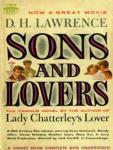
Author:D. H. Lawrence
Tag:D. H. LawrenceSons and Lovers
Sons and Lovers is a 1913 novel by the English writer D. H. Lawrence. The Modern Library placed it ninth on their list of the 100 best novels of the 20th century. While the novel initially incited a lukewarm critical reception, along with allegations of obscenity, it is today regarded as a masterpiece by many critics and is often regarded as Lawrence's finest achievement.
The third published novel of D. H. Lawrence, taken by many to be his earliest masterpiece, tells the story of Paul Morel, a young man and budding artist. Richard Aldington explains the semi-autobiographical nature of this masterpiece:
When you have experienced Sons and Lovers you have lived through the agonies of the young Lawrence striving to win free from his old life. Generally, it is not only considered as an evocative portrayal of working-class life in a mining community, but also an intense study of family, class and early sexual relationships.
The original 1913 edition was heavily edited by Edward Garnett who removed 80 passages, roughly a tenth of the text. The novel is dedicated to Garnett. Garnett, as the literary advisor to the publishing firm Duckworth, was an important figure in leading Lawrence further into the London literary world during the years 1911 and 1912. It was not until the 1992 Cambridge University Press edition was released that the missing text was restored.
Lawrence began working on the novel in the period of his mother's illness, and often expresses this sense of his mother's wasted life through his female protagonist Gertrude Morel. Letters written around the time of its development clearly demonstrate the admiration he felt for his mother — viewing her as a 'clever, ironical, delicately moulded woman' — and her apparently unfortunate marriage to his coal-miner father, a man of 'sanguine temperament' and instability. He believed that his mother had married below her class status. Rather interestingly, Lydia Lawrence wasn't born into the middle-class.[clarification needed] This personal family conflict experienced by Lawrence provided him with the impetus for the first half of his novel — in which both William, the older brother, and Paul Morel become increasingly contemptuous of their father — and the subsequent exploration of Paul Morel's antagonizing relationships with both his lovers, which are both incessantly affected by his allegiance to his mother.
The first draft of Lawrence's novel is now lost and was never completed, which seems to be directly due to his mother's illness. He did not return to the novel for three months, at which point it was titled 'Paul Morel'. The penultimate draft of the novel coincided with a remarkable change in Lawrence's life, as his health was thrown into turmoil and he resigned his teaching job in order to spend time in Germany. This plan was never followed, however, as he met and married the German minor aristocrat, Frieda Weekley, who was the wife of a former professor of his at the University of Nottingham. According to Frieda's account of their first meeting, she and Lawrence talked about Oedipus and the effects of early childhood on later life within twenty minutes of meeting.
The third draft of 'Paul Morel' was sent to the publishing house Heinemann; the response, a rather violent reaction, came from William Heinemann himself. His reaction captures the shock and newness of Lawrence's novel, 'the degradation of the mother [as explored in this novel], supposed to be of gentler birth, is almost inconceivable'; he encouraged Lawrence to redraft the novel one more time. In addition to altering the title to a more thematic 'Sons and Lovers', Heinemann's response had reinvigorated Lawrence into vehemently defending his novel and its themes as a coherent work of art. In order to justify its form, Lawrence explains, in letters to Garnett, that it is a 'great tragedy' and a 'great book', one that mirrors the 'tragedy of thousands of young men in England'.
The War of the Worlds
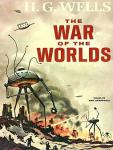
Author:H. G. Wells
Tag:H. G. WellsThe War of the Worlds
The War of the Worlds (1898), a science fiction novel by H. G. Wells, is the first-person narrative of an unnamed protagonist's (and his brother's) adventures in Surrey and London as Earth is invaded by Martians. Written in 1895–97, it is one of the earliest stories that detail a conflict between mankind and an extraterrestrial race. The novel is one of the most commented-on works in the science fiction canon.
The War of the Worlds has two parts, Book One: The Coming of the Martians and Book Two: The Earth under the Martians. The narrator, a philosophically inclined author, struggles to return to his wife while seeing the Martians lay waste to southern England. Book One (Chapters 14, 16, and 17) imparts the experience of his brother, also unnamed, who describes events in the capital and escapes the Martians by boarding a ship near Tillingham on the coast sixty-five miles northeast of London and is not mentioned again.
The plot has been related to invasion literature of the time. The novel has been variously interpreted as a commentary on evolutionary theory, British imperialism, and generally Victorian superstitions, fears and prejudices. At the time of publication it was classified as a scientific romance, like his earlier novel The Time Machine. The War of the Worlds has been both popular (having never gone out of print) and influential, spawning half a dozen feature films, radio dramas, a record album, various comic book adaptations, a television series, and sequels or parallel stories by other authors. It has even influenced the work of scientists, notably Robert Hutchings Goddard.
Three Men in a Boat
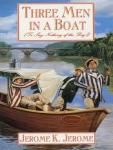
Author:Jerome K. Jerome
Tag:Three Men in a BoatJerome K. Jerome
Three Men in a Boat (To Say Nothing of the Dog), published in 1889, is a humorous account by English writer Jerome K. Jerome of a boating holiday on the Thames between Kingston and Oxford.
The book was initially intended to be a serious travel guide, with accounts of local history along the route, but the humorous elements took over to the point where the serious and somewhat sentimental passages seem a distraction to the comic novel. One of the most praised things about Three Men in a Boat is how undated it appears to modern readers — the jokes seem fresh and witty even today.
The three men are based on Jerome himself (the narrator J.) and two real-life friends, George Wingrave (who would become a senior manager in Barclays Bank) and Carl Hentschel (the founder of a London printing business, called Harris in the book), with whom he often took boating trips. The dog, Montmorency, is entirely fictional but, "as Jerome admits, developed out of that area of inner consciousness which, in all Englishmen, contains an element of the dog." The trip is a typical boating holiday of the time in a Thames camping skiff. This was just after commercial boat traffic on the Upper Thames had died out, replaced by the 1880s craze for boating as a leisure activity.
Because of the overwhelming success of Three Men in a Boat, Jerome later published a sequel, about a cycling tour in Germany, titled Three Men on the Bummel.
A similar book was published seven years before Jerome's work, entitled Three in Norway (by two of them) by J. A. Lees and W. J. Clutterbuck. It tells of three men on an expedition into the wild Jotunheimen in Norway.
Notre-Dame de Paris
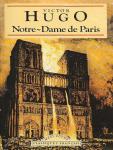
Author:Victor Hugo
Tag:Notre-Dame de ParisVictor Hugo
Notre-Dame de Paris is a novel by Victor Hugo published in 1831. The title refers to the Notre Dame Cathedral in Paris, on which the story is centered.
The story begins on Epiphany (6 January), 1482, the day of the Feast of Fools in Paris, France. Quasimodo, a deformed hunchback who is the bell-ringer of Notre Dame, is introduced by his crowning as the Pope of Fools.
Esmeralda, a beautiful Gypsy with a kind and generous heart, captures the hearts of many men, including those of Captain Phoebus and Pierre Gringoire, a poor street poet, but especially those of Quasimodo and his adoptive father, Claude Frollo, the Archdeacon of Notre Dame. Frollo is torn between his obsessive love and the rules of the church. He orders Quasimodo to kidnap her, but the hunchback is captured by Phoebus and his guards, who save Esmeralda.
Quasimodo is sentenced to be flogged and turned on the pillory for one hour, followed by another hour's public exposure. He calls for water. Esmeralda, seeing his thirst, offers him a drink. It saves him, and she captures his heart.
Esmeralda is later charged with the attempted murder of Phoebus, whom Frollo actually attempted to kill in jealousy after seeing him trying to seduce Esmeralda, and is tortured and sentenced to death by hanging. As she is being led to the gallows, Quasimodo swings down by the bell rope of Notre Dame and carries her off to the cathedral under the law of sanctuary.
Frollo later informs Pierre Gringoire that the Court of Parliament has voted to remove Esmeralda's right to sanctuary so she can no longer seek shelter in the church and will be taken from the church and killed. Clopin, a street performer, hears the news from Gringoire and rallies the Truands (criminals of Paris) to charge the cathedral and rescue Esmeralda.
When Quasimodo sees the Truands, he assumes they are there to hurt Esmeralda, so he drives them off. Likewise, he thinks the King's men want to rescue her, and tries to help them find her. She is rescued by Frollo and her phony husband Gringoire. But after yet another failed attempt to win her love, Frollo betrays Esmeralda by handing her to the troops and watches while she is being hanged.
When Frollo laughs during Esmeralda's hanging, Quasimodo pushes him from the heights of Notre Dame to his death. Quasimodo then goes to the vaults under the huge Gibbet of Montfaucon, and lies next to Esmeralda's corpse, where it had been unceremoniously thrown after the execution. He stays at Montfaucon, and eventually dies of starvation. About eighteen months later, the tomb is opened, and the skeletons are found. As someone tries to separate them, Quasimodo's bones turn to dust.
Wessex Tales

Author:Thomas Hardy
Tag:Wessex TalesThomas Hardy
Wessex Tales is an 1888 collection of tales written by Thomas Hardy, many of which are set before Hardy's birth in 1840.
Through them, Thomas Hardy talks about nineteenth century marriage, grammar, class status, how men and women were viewed, medical diseases and more.
In 1888, Wessex Tales contained only five stories ('The Three Strangers', 'The Withered Arm', 'Fellow-Townsmen', 'Interlopers at the Knap', and 'The Distracted Preacher') all published first in periodicals.
For the 1896 reprinting, Hardy added "An Imaginative Woman," but in 1912 moved this to another collection, Life's Little Ironies, while at the same time transferring two stories – "A Tradition of Eighteen Hundred and Four" and "The Melancholy Hussar of the German Legion" – from Life's Little Ironies to Wessex Tales.
A Pair of Blue Eyes
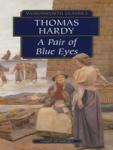
Author:Thomas Hardy
Tag:A Pair of Blue EyesThomas Hardy
A Pair of Blue Eyes is a novel by Thomas Hardy, published in 1873, first serialised between September 1872 and July 1873. It was Hardy's third novel, but the first to bear his name on publication.
The book describes the love triangle of a young woman, Elfride Swancourt, and her two suitors from very different backgrounds. Stephen Smith is a socially inferior but ambitious young man who adores her and with whom she shares a country background. Henry Knight is the respectable, established, older man who represents London society.
Elfride finds herself caught in a battle between her heart, her mind and the expectations of those around her - her parents and society. When Elfride's father finds that his guest and candidate for his daughter's hand, architect's assistant Stephen Smith, is the son of a mason, he immediately orders him to leave.
Elfride, out of desperation, marries a third man, Lord Luxellian. The conclusion finds both suitors travelling together to Elfride, both intent on claiming her hand, and neither knowing either that she is already married or that they are accompanying her corpse and coffin as they travel.
A Bundle of Letters
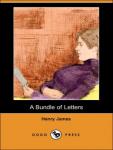
Author:Henry James
Tag:A Bundle of LettersHenry James
"A Bundle of Letters" is a comic short story by Henry James, originally published in The Parisian magazine in 1878, which is also when the story takes place. The story is one of James' few ventures into epistolary fiction. As he did so often, especially in the early stages of his career, James made the tale part of his international theme: his letter-writers represent a number of different countries. Although some of the characters look like well-worn stereotypes — the wolfish Frenchman, the pedantic and aggressively nationalistic German, the snobbish upper-class English siblings — James manages to endow most of them with enough twists and turns of personality to interest the reader. One character has even been taken as a sly satire on himself.
Several residents of a Paris boarding-house write letters to their friends and family back home; their primary subject is their reaction to each other. The main character is Miranda Hope, an angular but likeable Yankee Miss from Bangor, Maine who, quite bravely for a young woman of that era, is traveling in Europe alone. In her letters, she chatters to her mother about seeing the sights in Europe but doesn't like the Old World's treatment of its women, "and that is a point, you know, on which I feel very strongly." Her expressions of petulance with William Platt, who we realize must be a (so far luckless) suitor of hers back in Maine, are so offhand as to be amusing. Although she is in general the least affected and most sympathetic character in the story, her unawareness of the disdain in which most of the characters hold each other (including herself) makes her seem somewhat naive.
Meanwhile, society girl Violet Ray of New York writes to a friend that Miranda, who she sees as provincial, is "really too horrible." Another boarder, wannabe aesthete Louis Leverett (quite possibly a self-satire by James) gushes in his letter that "the great thing is to live, you know," amid much precious verbiage about the good, the true and the bee-a-u-tiful. An English boarder, Evelyn Vane, pens a scoffing note that Louis is always talking about the color of the sky, but she doubts if he's ever seen it except through a window-pane; and the German sees Leverett's "decadence" as further evidence that the English-speaking world is weak and ripe for takeover.
The Frenchman Leon Verdier almost drools in his letter about the charms of ces demoiselles among the boarders, and focuses primarily on their appearance. The rather threatening German professor is the only character both cynical and intelligent enough to realize how disdainful all the English speakers are of each other. However, he's also the least sympathetic character in the story. (James had little use for Germany and its culture.) While the other characters despise each other mostly on personal grounds, or from cultural misunderstanding, Herr Professor despises them all based on their national traits and general sub-human status (he calls the Frenchman "simian"). In a letter to his German friend, he simultaneously brags of his erudition and predicts that the weakness of these other nationalities augurs a bright future "for the deep-lunged children of the Fatherland!"
White Fang
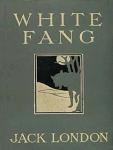
Author:Jack London
Tag:White FangJack London
White Fang is the titular character and a novel by American author Jack London. First serialized in Outing magazine, it was published in 1906. The story takes place in Yukon Territory, Canada, during the Klondike Gold Rush at the end of the 19th-century, and details a wild wolfdog's journey to domestication. White Fang is a companion novel (and a thematic mirror) to London's best-known work, The Call of the Wild, which is about a kidnapped, domesticated dog embracing his wild ancestry to survive and thrive in the wild.
Much of the novel is written from the view-point of his canine character, enabling London to explore how animals view their world and how they view humans. White Fang examines the violent world of wild animals and the equally violent world of humans. The book also explores complex themes including morality and redemption.
The story begins before the three-quarters wolf-dog hybrid is born, with two men and their sled dog team on a journey to deliver a coffin to a remote town named Fort McGurry in the higher area of the Yukon Territory, Canada. The men, Bill and Henry, are stalked by a large pack of starving wolves over the course of several days. Finally, after all of their dogs and Bill have been eaten, four more teams find Henry trying to escape from the wolves; the wolf pack scatters when they hear the large group of people coming. The story then follows the pack, which has been robbed of its last prey. When the pack finally manages to bring down a moose, the famine is ended; they eventually split up, and the story now follows a she-wolf and her mate, One Eye. The she-wolf gives birth to a litter of five cubs by the Mackenzie River, and all but one die from hunger. One Eye is killed by a lynx while trying to rob its den for food for the she-wolf and her cub; his mate later discovers his remains near the lynx's den. The surviving cub and the she-wolf are left to fend for themselves. Shortly after the she-wolf manages to successfully kill all the lynx kittens, prompting the lynx to track her down and a vicious fight breaks out. The she-wolf eventually kills the lynx but suffers severe injury, the lynx carcass is devoured over a period of seven days.
The cub comes across five Native Americans one day, and the she-wolf comes to his rescue. One man, Grey Beaver, recognizes the she-wolf as Kiche, his brother's wolfdog, who left during a famine. Grey Beaver's brother is dead, so he takes Kiche and her cub, christening the cub White Fang. White Fang has a harsh life in the Indian camp; the current puppy pack, seeing him as a wolf, immediately attack him. He is saved by the Indians, but the pups never accept him, and the leader Lip-lip singles him out for persecution. White Fang grows to become a savage, morose, solitary, and deadly fighter, "the enemy of his kind."
"In order to face the constant danger of hurt and even of destruction, his predatory and protective faculties were unduly developed. He became quicker of movement than the other dogs, swifter of foot, craftier, deadlier, more lithe, more lean with ironlike muscle and sinew, more enduring, more cruel, more ferocious, and more intelligent. He had to become all these things, else he would not have held his own nor survived the hostile environment in which he found himself."
When White Fang is five years old, he is taken to Fort Yukon so that Grey Beaver can trade with the gold-hunters. There, he is bought with several bottles of whiskey by a dog-fighter, Beauty Smith, who gets Grey Beaver addicted to alcohol. White Fang defeats all opponents, including several wolves and a lynx, until a bulldog is brought in to fight him. The bulldog manages to get a grip on the skin and fur of White Fang's neck, and slowly and surely begins to throttle him. White Fang nearly suffocates, but is rescued when a rich, young gold hunter, Weedon Scott, happens by and stops the fight.
Scott attempts to tame White Fang and after a long patient effort he succeeds. When Scott attempts to return to California alone, White Fang pursues him, and Scott decides to take the dog with him back home. In Sierra Vista, White Fang must adjust to the laws of the estate. At the end of the book, a murderous criminal, Jim Hall, tries to kill Weedon Scott's father, Judge Scott, for sentencing him to prison, not knowing that Hall was "railroaded". White Fang kills Hall and is nearly killed himself, but survives. As a result, the women of Scott's estate name him "The Blessed Wolf", and the story ends with White Fang relaxing in the sun with the puppies he had fathered with the sheep-dog Collie.
An Iceland Fisherman
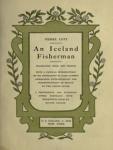
Author:Pierre Loti
Tag:An Iceland FishermanPierre Loti
An Iceland Fisherman (French: Pêcheur d'Islande, 1886) is a novel by French author Pierre Loti. It depicts the romantic but inevitably sad life of Breton fishermen who sail each summer season to the stormy Iceland cod grounds. Literary critic Edmund Gosse characterized it as "the most popular and finest of all his writings."
Loti's style is a combination of the French realist school, such as Emile Zola, and a form of literary impressionism.[1] As Jules Cambon says, Loti wrote at a "..time when M. Zola and his school stood at the head of the literary movement. There breathed forth from Loti's writings an all-penetrating fragrance of poesy [poetry], which liberated French literary ideals from the heavy and oppressive yoke of the Naturalistic school." Loti uses a simple vocabulary, "but these words, as used by him, take on a value we did not know they possessed; they awaken sensations that linger deeply within us." The characters are humble and simple working-class people, the incidents are normal every day affairs, dealing with the themes of love and separation.
Loti's greatest strength is in the depictions of nature, placing it center stage, as Cambon says:
He writes with extreme simplicity, and is not averse to the use of vague and indefinite expressions. And yet the wealth and precision of Gautier's and Hugo's language fail to endow their landscapes with the striking charm and intense life which are to be found in those of Loti. I can find no other reason for this than that which I have suggested above: the landscape, in Hugo's and in Gautier's scenes, is a background and nothing more; while Loti makes it the predominating figure of his drama. Our sensibilities are necessarily aroused before this apparition of Nature, blind, inaccessible, and all-powerful as the Fates of old.
It was adapted to a stage version by Louis Tiercelin with music by Guy Ropartz. It has been filmed three times, most notably in 1959 by French director Pierre Schoendoerffer.
The Woman in White

Author:Wilkie Collins
Tag:The Woman in WhiteWilkie Collins
The Woman in White is an epistolary novel written by Wilkie Collins in 1859, serialized in 1859–1860, and first published in book form in 1860. It is considered to be among the first mystery novels and is widely regarded as one of the first (and finest) in the genre of 'sensation novels'.
The story is considered an early example of detective fiction with the hero, Walter Hartright, employing many of the sleuthing techniques of later private detectives. The use of multiple narratives draws on Collins's legal training, and as he points out in his Preamble: 'the story here presented will be told by more than one pen, as the story of an offence against the laws is told in Court by more than one witness'. In 2003, Robert McCrum writing for The Observer listed The Woman in White number 23 in "the top 100 greatest novels of all time", and the novel was listed at number 77 on the BBC's survey The Big Read.
Walter Hartright, a young art teacher, is walking from Hampstead to London late one summer's evening, when he meets a mysterious woman dressed in white, apparently in deep distress. He helps her on her way to London, but later learns that she has escaped from an asylum. The next day he travels north to Limmeridge House, having been hired as a drawing master to the residents of the house; he had been recommended for the job by his friend, Pesca, an Italian language professor. The Limmeridge household comprises Mr Frederick Fairlie, and Walter's students: Laura Fairlie, Mr Fairlie's niece, and Marian Halcombe, her devoted half-sister. Several days after he arrives, Hartright is shocked to realize that Laura bears an astonishing resemblance to the woman in white, called Anne Catherick. The mentally disadvantaged Anne had lived for a time in Cumberland as a child and was devoted to Laura's mother, who first dressed her in white.
Walter and Laura quickly fall in love. Laura, however, has promised her father that she will marry Sir Percival Glyde, and Marian – knowing that Laura loves Walter in return – advises Walter to forget his love, and leave Limmeridge. Anne, after sending a letter to Laura warning her against Glyde, meets Hartright who becomes convinced that Glyde was responsible for shutting Anne in the asylum. Despite the misgivings of the Fairlie's lawyer over the financial terms of the marriage settlement, Laura and Glyde marry in December 1849 and travel to Italy for 6 months. Hartright also leaves England, joining an expedition to Honduras. After their honeymoon, Sir Percival and Lady Glyde return to his family estate, Blackwater Park, in Hampshire; they are accompanied by Glyde's friend, Count Fosco (who is married to Laura's aunt). Marian Halcombe is also living at Blackwater and learns that Glyde is in financial difficulties. Sir Percival unsuccessfully attempts to bully Laura into signing a document which would allow him to use her marriage settlement of £20,000. Determined to protect her sister, Marian crawls out onto a roof overlooking Percy and Fosco whilst they plot; but it begins to rain, and Marian, completely soaked, falls into a fever which shortly turns into typhus.
While Marian is ill, Laura is tricked into travelling to London. Her identity and that of Anne Catherick are then switched. Anne Catherick dies of a heart condition and is buried in Cumberland as Laura, while Laura is drugged and placed in the asylum as Anne Catherick. When Marian recovers and visits the asylum, hoping to learn something from Anne Catherick, she finds Laura, supposedly suffering from the delusion that she is Lady Glyde.
Marian bribes the nurse and Laura escapes. Hartright has safely returned from Honduras, and the three live together in obscure poverty, determined to restore Laura's identity. After some time Walter discovers Glyde's secret, which is that he was illegitimate, and therefore not entitled to inherit his parents' property. This secret was known only to Anne's mother, and while Anne never knew the secret, she spoke and acted as if she did. Many years earlier, Glyde had forged an entry in the marriage register at Old Welmingham Church to conceal his illegitimacy and hence unlawful inheritance of estate and title. Believing Walter either has discovered, or will discover his secret, Glyde attempts to destroy the register entry, but the church vestry catches fire and he perishes in the flames. Confronting Anne's mother, Hartright discovers that Anne was the illegitimate child of Laura's father, which accounts for their resemblance. On returning to London to resume his battle with Fosco, Hartright marries Laura. When he secretly tails Fosco to investigate him, Hartright also discovers that Fosco belongs to, and has betrayed, an Italian secret society (dubbed "The Brotherhood"), of which Pesca is a high-ranking member with enough authority to dispatch him. Using Fosco's weakness as bargaining chip, Hartright now has the power to force a written confession from Fosco and Laura's identity is restored. Fosco departs from England in haste, only to be discovered by the Brotherhood's agents some time later and murdered. Since Hartright and Laura have married, on the death of Frederick Fairlie, their son becomes the Heir of Limmeridge.
Nicholas Nickleby
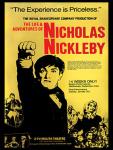
Author:Charles Dickens
Tag:Charles DickensNicholas Nickleby
Nicholas Nickleby; or, The Life and Adventures of Nicholas Nickleby is a novel by Charles Dickens. Originally published as a serial from 1838 to 1839, it was Dickens' third novel.
Nicholas Nickleby's father dies unexpectedly after losing all of his money in a poor investment. Nicholas, his mother and his younger sister, Kate, are forced to give up their comfortable lifestyle in Devonshire and travel to London to seek the aid of their only relative, Nicholas's uncle Ralph Nickleby. Ralph, a cold and ruthless businessman, has no desire to help his destitute relations and hates Nicholas, who reminds him of his dead brother, on sight. He gets Nicholas a low-paying job as an assistant to Wackford Squeers, who runs the school Dotheboys Hall in Yorkshire. Nicholas is initially wary of Squeers (a very unpleasant man with one eye) because he is gruff and violent towards his young charges, but he tries to quell his suspicions. As Nicholas boards the stagecoach for Greta Bridge, he is handed a letter by Ralph's clerk, Newman Noggs. A once-wealthy businessman, Noggs lost his fortune, became a drunk and had no other recourse but to seek employment with Ralph, whom he loathes. The letter expresses concern for the innocent young man and offers assistance if Nicholas ever requires it. Once he arrives in Yorkshire, Nicholas comes to realise that Squeers is running a scam: he takes in unwanted children (most of whom are illegitimate, crippled or deformed) for a high fee, and starves and mistreats his charges while using the money sent by their parents to pad his own pockets. Squeers and his monstrous wife whip and beat the children regularly while spoiling their own son rotten. While he is there, Nicholas befriends a simple boy named Smike, who is older than the other “students” and now acts as an unpaid servant. Nicholas attracts the attention of Fanny Squeers, his employer's plain and shrewish daughter, who deludes herself into thinking that Nicholas is in love with her. She attempts to disclose her affections during a game of cards, but Nicholas doesn't catch her meaning. Instead he ends up flirting with her friend Tilda Price, to the consternation of both Fanny and Tilda's friendly but crude-mannered fiancé John Browdie. After being accosted by Fanny again, Nicholas bluntly tells her he does not return her affections and wishes to be free of the horrible atmosphere of Dotheboys Hall, earning her enmity.
Fanny uses her new-found loathing of Nicholas to make life difficult for the only friend he has at the school: Smike, whom Squeers takes to beating more and more frequently. One day Smike runs away, but is caught and brought back to Dotheboys. Squeers begins to beat him, but Nicholas intervenes. Squeers strikes him across the face and Nicholas snaps, beating the schoolmaster violently. Quickly packing his belongings and leaving Dotheboys Hall, he meets John Browdie on the way. Browdie finds the idea that Squeers himself has been beaten uproariously funny, and gives Nicholas money and a walking staff to aid him on his trip back to London. At dawn, he is found by Smike, who begs to come with him. Nicholas and Smike set out towards London.
Meanwhile, Kate and her mother are forced by Ralph to move out of their lodgings in the house of the kindly portrait painter Miss LaCreevy and into a cold and drafty house Ralph owns in a London slum. Ralph finds employment for Kate working for a fashionable milliner, Madame Mantalini. Her husband, Mr Mantalini, is a gigolo who depends on his (significantly older) wife to supply his extravagant tastes and offends Kate by leering at her. Kate proves initially clumsy at her job, which endears her to the head of the showroom, Miss Knagg, a vain and foolish woman who uses Kate to make herself look better. This backfires when a client prefers to be served by the young and pretty Kate rather than the ageing Miss Knagg. Kate is blamed for the insult, and as a result, Kate is ostracised by the other milliners and left friendless.
Nicholas seeks out the aid of Newman Noggs, who shows him a letter that Fanny Squeers has written to Ralph viciously exaggerating the events of the beating. Noggs tells Nicholas, who is intent on confronting his uncle, that Ralph is out of town and advises him to find a job. Nicholas goes to an employment office, where he encounters a strikingly beautiful girl. His search for employment fails, and he is about to give up when Noggs offers him the meagre position of French teacher to the children of his neighbours, the Kenwigs family, and Nicholas is hired under the assumed name of “Johnson” to teach the children French.
Ralph asks Kate to attend a dinner he is hosting for some business associates. When she arrives she discovers she is the only woman in attendance, and it becomes clear Ralph is using her as bait to entice the foolish nobleman Lord Frederick Verisopht to do business with him. The other guests include Verisopht's mentor and friend, the disreputable nobleman Sir Mulberry Hawk, who humiliates Kate at dinner by making her the subject of an offensive bet. She flees the table, but is later accosted by Hawk. He attempts to force himself on her but is stopped by Ralph. Ralph shows some unexpected tenderness towards Kate but insinuates that he will withdraw his financial help if she tells her mother about what happened.
The next day, Nicholas discovers that his uncle has returned. He visits his mother and sister just as Ralph is reading them Fanny Squeers’ letter and slandering Nicholas. He confronts his uncle, who vows to give no financial assistance to the Nicklebys as long as Nicholas stays with them. His hand forced, Nicholas agrees to leave London, but warns Ralph that a day of reckoning will one day come between them.
The next morning, Nicholas and Smike travel towards Portsmouth with the intention of becoming sailors. At an inn, they encounter the theatrical manager Vincent Crummles, who hires Nicholas (still going under the name of Johnson) on sight as his new juvenile lead and playwright with the task of adapting French tragedies into English and then modifying them for the troupe's minimal dramatic abilities. Nicholas and Smike join the acting company and are warmly received by the troupe, which includes Crummles’s formidable wife, their daughter, “The Infant Phenomenon”, and many other eccentric and melodramatic thespians. Nicholas and Smike make their debuts in Romeo and Juliet, as Romeo and the Apothecary respectively, and are met with great acclaim from the provincial audiences. Nicholas enjoys a flirtation with his Juliet, the lovely Miss Snevellici.
Back in London, Mr Mantalini’s reckless spending has bankrupted his wife. Madame Mantalini is forced to sell her business to Miss Knagg, whose first order of business is to fire Kate. She finds employment as the companion of the social-climbing Mrs Wittiterly. Meanwhile, Sir Mulberry Hawk begins a plot to humiliate Kate for refusing his advances. He uses Lord Frederick, who is infatuated with her, to discover where she lives from Ralph. He is about to succeed in this plot when Mrs Nickleby enters Ralph’s office, and the two rakes switch their attentions from Kate’s uncle to her mother, successfully worming their way into Mrs Nickleby’s company and gaining access to the Wittiterly house. Mrs. Wittiterly grows jealous and admonishes Kate for flirting with the noblemen. The unfairness of this accusation makes Kate so angry that she rebukes her employer, who flies into a fit of hysterics. With no other recourse, Kate goes to her uncle for assistance, but he refuses to help her, citing his business relationships with Hawk and Verisopht. It is left to Newman Noggs to come to her aid, and he writes to Nicholas, telling him in vague terms of his sister’s immediate need for him. Nicholas immediately quits the Crummles troupe and returns to London.
Noggs and Miss La Creevy confer, and decide that delay telling Nicholas Kate's plight until it is too late at night for him to seek out Hawk and take violent action. So, when Nicholas arrives, Both Noggs and Miss La Creevy are out. Nicholas is about to search the city for them when he accidentally overhears Hawk and Lord Frederick rudely toasting Kate in a coffeehouse. He is able to glean from their conversation what has happened, and confronts them. Hawk refuses to give Nicholas his name or respond to his accusations. When he attempts to leave, Nicholas follows him out, and leaps onto the running board of his carriage, demanding his name. Hawk strikes him with a riding crop, and Nicholas loses his temper, returning the blow and spooking the horses, causing the carriage to crash. Hawk is injured in the crash and vows revenge, but Lord Verisopht, remorseful for his treatment of Kate, tells him that he will attempt to stop him. Later, after Hawk has recovered, they quarrel over Hawk’s insistence on revenging himself on Nicholas. Verisopht strikes Hawk, resulting in a duel. Verisopht is killed, and Hawk flees to France. As a result, Ralph loses a large sum of money owed to him by the deceased lord.
Nicholas collects Kate from the Wittiterlys, and with their mother and Smike, they move back into Miss LaCreevy’s house. Nicholas pens a letter to Ralph refusing, on behalf of his family, a penny of his uncle’s money or influence. Returning to the employment office, Nicholas meets Charles Cheeryble, a wealthy and extremely benevolent merchant who runs a business with his twin brother Ned. Hearing Nicholas’s story, the brothers take him into their employ at a generous salary and provide his family with a small house in a London suburb.
Ralph encounters a beggar, who recognises him and reveals himself as Brooker, Ralph’s former employee. He attempts to blackmail Ralph with a piece of unknown information, but is driven off. Returning to his office, Ralph receives Nicholas’s letter and begins plotting against his nephew in earnest. Wackford Squeers returns to London and joins Ralph in his plots.
Smike has the misfortune to run into Squeers on a London street, who kidnaps him. Luckily for Smike, John Browdie is honeymooning in London with his new wife Tilda and discovers his predicament. When they have dinner with Squeers, Browdie fakes an illness and takes the opportunity to rescue Smike and send him back to Nicholas. In gratitude, Nicholas invites the Browdies to dinner. At the party, also attended by the Cheerybles’s nephew Frank and their elderly clerk Tim Linkinwater, Ralph and Squeers attempt to reclaim Smike by presenting forged documents that he is the long-lost son of a man named Snawley (who, in actuality, is a friend of Squeers with children at Dotheboys Hall). Smike refuses to go, but the threat of legal action remains.
While at work, Nicholas encounters the beautiful young woman he had seen in the employment office and realises he is in love with her. The brothers tell him that her name is Madeline Bray, the penniless daughter of a debtor, Walter Bray, and enlist his help in obtaining small sums of money for her by commissioning her artwork, the only way they can help her due to her tyrannical father.
Arthur Gride, an elderly miser, offers to pay a debt Ralph is owed by Walter Bray in exchange for the moneylender’s help. Gride has illegally gained possession of the will of Madeline’s grandfather, and she will become an heiress upon the event of her marriage. The two moneylenders convince Bray to bully his daughter into accepting the disgusting Gride as a husband with the promise of paying off his debts. Ralph is not aware of Nicholas’ involvement with the Brays, and Nicholas does not discover Ralph’s scheme until the eve of the wedding. He appeals to Madeline to cancel the wedding, but despite her feelings for Nicholas, she is too devoted to her dying father to go against his wishes. On the day of the wedding, Nicholas attempts to stop it once more but his efforts prove academic when Bray, guilt-ridden at the sacrifice his daughter has made for him, dies unexpectedly. Madeline thus has no reason to marry Gride and Nicholas and Kate take her to their house to recover.
Smike has contracted tuberculosis and become dangerously ill. In a last attempt to save his friend’s health, Nicholas takes him to his childhood home in Devonshire, but Smike’s health rapidly deteriorates. On his deathbed, Smike is startled to see the man who brought him to Squeers' school. Nicholas dismisses it as an illusion but it is later revealed that Smike was right. After confessing his love for Kate, Smike dies peacefully in Nicholas’s arms.
When they return to Gride’s home after the aborted wedding, Ralph and Gride discover that Peg Sliderskew, Gride’s aged housekeeper, has robbed Gride, taking, amongst other things, the will. To get it back, Ralph enlists Wackford Squeers’s services to track down Peg. Noggs discovers this plot, and with the help of Frank Cheeryble, he is able to recover the will and have Squeers arrested.
The Cheeryble brothers confront Ralph, informing him that his various schemes against Nicholas have failed. They advise him to retire from London before charges are brought up against him, as Squeers is determined to confess all and implicate Ralph. He refuses their help, but is summoned back to their offices that evening and told that Smike is dead. When he reacts to the news with vicious glee, the brothers reveal their final card. The beggar Brooker emerges, and tells Ralph that Smike was his own son. As a young man, Ralph had married a woman for her fortune, but kept it secret so as to not forfeit her inheritance. She eventually left him after bearing him a son, whom he entrusted to Brooker, who was then his clerk. Brooker, taking the opportunity for vengeance, took the boy to Squeers’ school and told Ralph the boy had died. Brooker now repents his action, but a transportation sentence kept him from putting the matter right. Devastated at the thought that his only son died as the best friend of his greatest enemy, Ralph commits suicide.
Squeers is sentenced to transportation to Australia, and, upon hearing this, the boys at Dotheboys Hall rebel against the Squeers family and escape with the assistance of John Browdie. Nicholas becomes a partner in the Cheerybles' firm and marries Madeline. Kate and Frank Cheeryble also marry, as do Tim Linkinwater and Miss LaCreevy. Brooker dies penitent. Noggs recovers his respectability. The Nicklebys and their now extended family return to Devonshire, where they live in peace and contentment.
He Fell in Love with His Wife

Author:Edward Payson Roe
Tag:He Fell in Love with His WifeEdward Payson Roe
The dreary March evening is rapidly passing from murky gloom to obscurity. Gusts of icy rain and sleet are sweeping full against a man who, though driving, bows his head so low that he cannot see his horses. The patient beasts, however, plod along the miry road, unerringly taking their course to the distant stable door. The highway sometimes passes through a grove on the edge of a forest, and the trees creak and groan as they writhe in the heavy blasts. In occasional groups of pines there is sighing and moaning almost human in suggestiveness of trouble. Never had Nature been in a more dismal mood, never had she been more prodigal of every element of discomfort, and never had the hero of my story been more cast down in heart and hope than on this chaotic day which, even to his dull fancy, appeared closing in harmony with his feelings and fortune. He is going home, yet the thought brings no assurance of welcome and comfort. As he cowers upon the seat of his market wagon, he is to the reader what he is in the fading light--a mere dim outline of a man. His progress is so slow that there will be plenty of time to relate some facts about him which will make the scenes and events to follow more intelligible.
The Sorrows of Young Werther
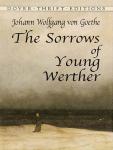
Author:Johann Wolfgang von Goethe
Tag:Johann Wolfgang von GoetheThe Sorrows of Young Werther
The Sorrows of Young Werther (German: Die Leiden des jungen Werthers) is an epistolary and loosely autobiographical novel by Johann Wolfgang von Goethe, first published in 1774; a revised edition of the novel was published in 1787. Werther was an important novel of the Sturm und Drang period in German literature, and influenced the later Romantic literary movement.
The six weeks of its intensive writing, in January–March 1774, instantly made the 24-year-old Goethe one of the first international literary celebrities. Of all his further works, this book was the most known to the general public. Towards the end of his life, a personal visit to Weimar became crucial to any young man's tour of Europe.
The majority of The Sorrows of Young Werther is presented as a collection of letters written by Werther, a young artist of highly sensitive and passionate temperament, and sent to his friend Wilhelm.
In these letters, Werther gives a very intimate account of his stay in the fictional village of Wahlheim (based on the town of Garbenheim, near Wetzlar).[citation needed] He is enchanted by the simple ways of the peasants there. He meets Charlotte, a beautiful young girl who is taking care of her siblings following the death of their mother. Despite knowing beforehand that Charlotte is already engaged to a man named Albert who is 11 years her senior, Werther falls in love with her.
Although this causes Werther great pain, he spends the next few months cultivating a close friendship with both of them. His pain eventually becomes so great that he is forced to leave and go to Weimar. While he is away, he makes the acquaintance of Fräulein von B. He suffers a great embarrassment when he forgetfully visits a friend and has to face the normal weekly gathering of the entire aristocratic set. He returns to Wahlheim after this, where he suffers more than he did before, partially because Lotte and Albert are now married. Every day serves as a torturous reminder that Lotte will never be able to requite his love. Out of pity for her friend and respect for her husband, Lotte comes to the decision that Werther must not visit her so frequently. He visits her one final time, and they are both overcome with emotion after Werther's recitation of a portion of "Ossian".
Werther had realized even before this incident that one member of their love triangle — Lotte, Albert or Werther himself — had to die in order to resolve the situation. Unable to hurt anyone else or seriously consider committing murder, Werther sees no other choice but to take his own life. After composing a farewell letter to be found after his suicide, he writes to Albert asking for his two pistols, under a pretence that he is going "on a journey". Lotte receives the request with great emotion and sends the pistols. Werther then shoots himself in the head, but does not expire until 12 hours after he has shot himself. He is buried under a linden tree, a tree he talks about frequently in his letters, and the funeral is not attended by clergymen, Albert or his beloved Lotte.
The Pickwick Papers

Author:Charles Dickens
Tag:Charles DickensThe Pickwick Papers
The Posthumous Papers of the Pickwick Club (also known as The Pickwick Papers) is the first novel by Charles Dickens. He was asked to contribute to the project as an up-and-coming writer following the success of Sketches by Boz, published in 1836 (most of Dickens' novels were issued in shilling instalments before being published in the complete volume). Dickens (still writing under the pseudonym of Boz) increasingly took over the unsuccessful monthly publication after the original illustrator Robert Seymour had committed suicide.
Written for publication as a serial, The Pickwick Papers is a sequence of loosely-related adventures. The action is given as occurring 1827–8, though critics have noted some seeming anachronisms. The novel's main character, Samuel Pickwick, Esquire, is a kind and wealthy old gentleman, and the founder and perpetual president of the Pickwick Club. To extend his researches into the quaint and curious phenomena of life, he suggests that he and three other "Pickwickians" (Mr Nathaniel Winkle, Mr Augustus Snodgrass, and Mr Tracy Tupman) should make journeys to remote places from London and report on their findings to the other members of the club. Their travels throughout the English countryside by coach provide the chief theme of the novel. A distinctive and valuable feature of the work is the generally accurate descriptions of the old coaching inns of England.
Its main literary value and appeal is formed by its numerous memorable characters. Each character in The Pickwick Papers, as in many other Dickens novels, is drawn comically, often with exaggerated personalities. Alfred Jingle, who joins the cast in chapter two, provides an aura of comic villainy. His devious tricks repeatedly land the Pickwickians in trouble. These include Jingle's nearly-successful attempted elopement with the spinster Rachael Wardle of Dingley Dell manor, misadventures with Dr Slammer, and others.
Further humour is provided when the comic cockney Sam Weller makes his advent in chapter 10 of the novel. First seen working at the White Hart Inn in The Borough, Weller is taken on by Mr Pickwick as a personal servant and companion on his travels and provides his own oblique ongoing narrative on the proceedings. The relationship between the idealistic and unworldly Pickwick and the astute cockney Weller has been likened to that between Don Quixote and Sancho Panza.
Other notable adventures include Mr Pickwick's attempts to defend a lawsuit brought by his landlady, Mrs Bardell, who (through an apparent misunderstanding on her part) is suing him for the breach of promise to marry her. Another is Mr Pickwick's incarceration at Fleet prison for his stubborn refusal to pay the compensation to her because he doesn't want to give a penny to Mrs Bardell's lawyers, the unscrupulous firm of Messrs. Dodson and Fogg. The general humorous tone is here briefly replaced by biting social satire (including against the legal establishment) and foreshadows major themes in Dickens' later books. Mr Pickwick, Sam Weller, and Weller Senior also appear in Dickens's serial, Master Humphrey's Clock.
Pudd'nhead Wilson
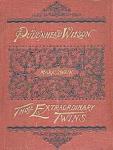
Author:Mark Twain
Tag:Pudd'nhead WilsonMark Twain
Pudd'nhead Wilson is an ironic novel by Mark Twain. It was serialized in The Century Magazine (1893-4), before being published as a novel in 1894.
The setting is the fictional Missouri frontier town of Dawson's Landing on the banks of the Mississippi River in the first half of the 19th century. David Wilson, a young lawyer, moves to town and a clever remark of his is misunderstood, which causes locals to brand him a "pudd'nhead" – a nitwit. His hobby of collecting fingerprints does not raise his standing in the townsfolk's eyes, who see him as an eccentric and do not frequent his law practice.
Puddn'head Wilson moves into the background as the focus shifts to the slave Roxy, her son, and the family they serve. Roxy is only one-sixteenth black, and her son Valet de Chambre (referred to as "Chambers") is only 1/32 black. Roxy is principally charged with caring for her inattentive master's infant son Tom Driscoll, who is the same age as her own son. After fellow slaves are caught stealing and are nearly sold "down the river", to a master further south, Roxy fears for her life and the life of her son. First she decides to kill herself and Chambers to avoid being sold down the river, but then decides instead to switch Chambers and Tom in their cribs so that her son will live a life of privilege.
The narrative moves forward two decades, and Tom Driscoll (formerly Valet de Chambre), believing himself to be wholly white and raised as a spoiled aristocrat, has grown to be a selfish and dissolute young man. Tom's father has died and granted Roxy her freedom. Roxy worked for a time on river boats, and saved money for her retirement. When she finally is able to retire, she discovers that her bank has failed and all of her savings are gone. She returns to Dawson's Landing to ask for money from Tom.
Tom meets Roxy with derision and Roxy tells him that he is her son, and uses this fact to blackmail him into financially supporting her.
Twin Italian noblemen visit the town to some fanfare, a murder is committed, and the story takes on the form of a crime novel.
"The reader knows from the beginning who committed the murder, and the story foreshadows how the crime will be solved. The circumstances of the denouement, however, possessed in its time great novelty, for fingerprinting had not then come into official use in crime detection in the United States. Even a man who fooled around with it as a hobby was thought to be a simpleton, a 'pudd'nhead'." (From Langston Hughes' introduction to the novel)
The story describes the racism of the antebellum south, even as to seemingly white people with minute traces of African ancestry, and the acceptance of that state of affairs by all involved, including the black population.
Mary Barton
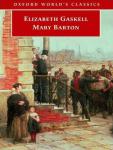
Author:Elizabeth Cleghorn Gaskell
Tag:Mary BartonElizabeth Cleghorn Gaskell
Mary Barton is the first novel by English author Elizabeth Gaskell, published in 1848. The story is set in the English city of Manchester between 1839 and 1842, and deals with the difficulties faced by the Victorian lower class. It is subtitled 'A Tale of Manchester Life'.
The novel begins in Manchester, where we are introduced to the Bartons and the Wilsons, two working-class families. John Barton is a questioner of the distribution of wealth and the relations between rich and poor. Soon his wife dies—he blames it on her grief over the disappearance of her sister Esther. Having already lost his son Tom at a young age, Barton is left to raise his daughter, Mary, alone and now falls into depression and begins to involve himself in the Chartist, trade-union movement.
Mary takes up work at a dressmaker's (her father having objected to her working in a factory) and becomes subject to the affections of hard-working Jem Wilson and Henry Carson, son of a wealthy mill owner. She fondly hopes, by marrying Carson, to secure a comfortable life for herself and her father, but immediately after refusing Jem's offer of marriage she realizes that she truly loves him. She therefore decides to evade Carson, planning to show her feelings to Jem in the course of time. Jem believes her decision to be final, though this does not change his feelings for her.
Meanwhile, Esther, a "street-walker," returns to warn John Barton that he must save Mary from becoming like her. He simply pushes her away, however, and she's sent to jail for a month on the charge of vagrancy. Upon her release she talks to Jem with the same purpose. He promises that he will protect Mary and confronts Carson, eventually entering into a fight with him, which is witnessed by a policeman passing by.
Not long afterwards, Carson is shot dead, and Jem is arrested for the crime, his gun having been found at the scene. Esther decides to investigate the matter further and discovers that the wadding for the gun was a piece of paper on which is written Mary's name.
She visits her niece to warn her to save the one she loves, and after she leaves Mary realises that the murderer is not Jem but her father. She is now faced with having to save her lover without giving away her father. With the help of Job Legh (the intelligent grandfather of her blind friend Margaret), Mary travels to Liverpool to find the only person who could provide an alibi for Jem — Will Wilson, Jem's cousin and a sailor, who was with him on the night of the murder. Unfortunately, Will's ship is already departing, so that, after Mary chases after the ship in a small boat, the only thing Will can do is promise to return in the pilot ship and testify the next day.
During the trial, Jem learns of Mary's great love for him. Will arrives in court to testify, and Jem is found 'not guilty'. Mary has fallen ill during the trial and is nursed by Mr Sturgis, an old sailor, and his wife. When she finally returns to Manchester she has to face her father, who is crushed by his remorse. He summons John Carson, Henry's father, to confess to him that he is the murderer. Carson is still set on justice, but after turning to the Bible he forgives Barton, who dies soon afterwards in Carson's arms. Not long after this Esther comes back to Mary's home, where she, too, dies soon.
Jem decides to leave England, where, his reputation damaged, it would be difficult for him to find a new job. The novel ends with the wedded Mary and Jem, their little child, and Mrs Wilson living happily in Canada. News comes that Margaret has regained her sight and that she and Will, soon to be married, will visit.